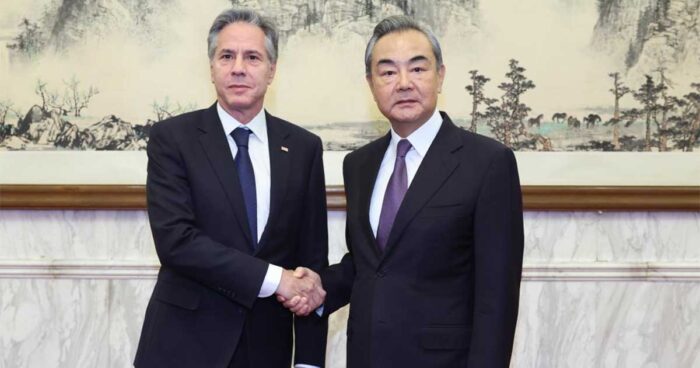
US Secretary of State Antony Blinken (L) shakes hands with China’s Foreign Minister Wang Yi during a visit to Beijing on June 19, 2023.
US Secretary of State Antony J. Blinken must raise the “deteriorating” situation in Tibet both privately and publicly during his trip this week to China, the International Campaign for Tibet said today.
ICT, an advocacy group that promotes human rights and democratic freedoms for the Tibetan people, sent a letter to Blinken today, April 22, 2024, on behalf of its roughly 50,000 members in the United States. Blinken is scheduled to visit China April 24-26.
In the letter, ICT President Tencho Gyatso urges Blinken to “raise the issue of Tibet during your meetings with Chinese leaders later this week as well as publicly in front of the press.”
The topics for Blinken to address include China’s kidnapping of the Panchen Lama, the high-ranking Tibetan Buddhist leader who will turn 35 during Blinken’s trip; China’s attempts to interfere in the succession of the Dalai Lama, who is now 88; and China’s responsibility to resume negotiations with Tibetan leaders to resolve Tibet’s status.
China has occupied Tibet, a neighboring country in the Himalayas, for over 65 years, turning it into one of the worst human rights crises in the world. Under China’s iron rule, Tibet now has a global freedom score of 0 out of 100, according to the watchdog group Freedom House.
Panchen Lama’s kidnapping
The Panchen Lama is one of the most important figures in Tibetan Buddhism. He will turn 35 on Thursday, April 25, but he has been missing since the age of 6.
In 1995, the Dalai Lama recognized Gedhun Choekyi Nyima, a 6-year-old boy in Tibet, as the reincarnated Panchen Lama. But just three days later, Chinese authorities disappeared the child and his parents. The Panchen Lama has not been seen in public since, and his whereabouts are unknown.
With the Panchen Lama reaching a milestone birthday during Blinken’s trip, ICT urges Blinken to raise the case of the Panchen Lama with Chinese leaders, call for his release, and ask for concrete evidence of his health and location, as well as for the restoration of his right to take his place at his monastery.
ICT also urges Blinken to speak up during his trip for the over 1 million Tibetan children whom China has separated from their families, language and culture at state-run, compulsory boarding schools.
In August 2023, Blinken announced State Department sanctions on Chinese officials involved in the boarding school system.
Dalai Lama’s succession
China’s kidnapping of the Panchen Lama is a likely preview of its plan to interfere in the succession of the Dalai Lama, the Tibetan Buddhist leader who has lived in India since the Chinese government forced him to flee into exile from Tibet in 1959.
The Dalai Lama will turn 89 this year. When the time comes for his succession, China has already made clear it plans to appoint its own hand-picked successor, who would serve Beijing as a mouthpiece and political agent.
China’s attempts to control the Dalai Lama’s succession will never be accepted by Tibetan Buddhists and will only violate the religious freedom and rights of Tibetan Buddhists in the appointment of their own faith leaders here in the United States and around the globe.
While Blinken is in China, ICT urges him to remind Chinese officials that it is US policy that the selection of religious leaders is strictly a religious issue and that only the current Dalai Lama and his followers hold authority over his succession.
Resolving Tibet
ICT also urges Blinken to push his Chinese counterparts to resume dialogue with Tibetan leaders to resolve Tibet’s status¬—and to be ready to counter their objections.
Between 2002-10, Chinese officials met for 10 rounds of dialogue with the Dalai Lama’s envoys. But since then, China has refused to negotiate in good faith.
ICT’s letter notes that the previous negotiations only took place after foreign governments consistently called for dialogue.
The letter also states that the US is committed to encouraging substantive dialogue without preconditions between the Dalai Lama and the Chinese government that leads to a negotiated agreement on Tibet, as mandated by the Tibetan Policy and Support Act of 2020.

